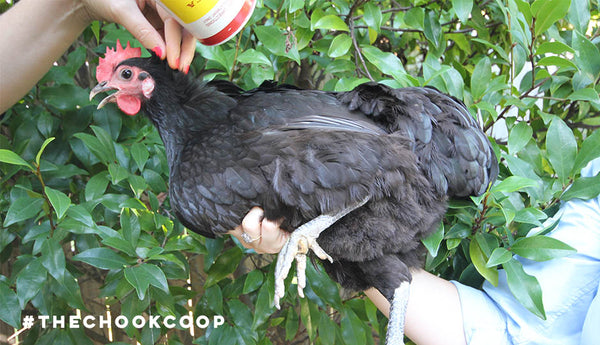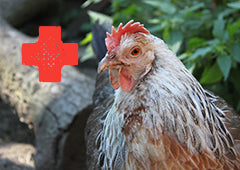Is one or more of your flock displaying some odd behaviours? Can you see some tell-tale signs of illness, such as a runny nose or droopy, lethargic body language? Your chicken may be feeling a bit under tsume weather, and might need your assistance to help their health get back on track.
How do I know if my chicken is sick?
When tending to your backyard flock, keep an eye out for any unusual behaviour. Most symptoms are easy to identify, and can help you further discover what the underlying issue may be. Some signs your chickens aren’t feeling up to scratch include:
-
A pale, limp comb (potential symptoms of frostbite, worms)
-
Coughing, wheezing, runny nose (Chronic Respiratory Disease)
-
Mangy/patchy feathers (lice or mites)
-
Heavy breathing, holding wings away from their body (heat stroke)
For more symptoms and what to look for, read our Check Your Chicken - How To Tell If Your Flock Is Healthy article.
I’ve identified the symptoms...what now?
We always say - when in doubt, call the vet. If your chicken seems to be fading fast, or their condition doesn’t improve (and/or continues to deteriorate), then calling the vet is always the option we advise. A professional opinion is definitely the best course of action.
If your chicken looks ok but are still showing some symptoms of illness, it may be a good idea to isolate that chicken in a different area until you have identified the problem - it may stop any diseases spreading to the other feathered friends in your flock.
If your chickens are displaying some symptoms of illness, here’s a few ways you can try to bring them back to health:
1. Symptoms: Sniffly nose, coughing, wheezing
Could be: Chronic Respiratory System
What to do: Make sure your coop is clean and free from dust. In some cases, cleaning the coop will also clear all your chickens cold and flu symptoms up! Also, ensure the coop is well ventilated - drafts are a surefire road to a sniffly nose and a cough for your flock.
If this doesn’t clear up the symptoms, then antibiotics may be required - give your vet a call to find out what’s you should give your flock.
2. Symptoms: Heavy breathing/panting, holding wings away from their body, loss of appetite
Could be: Heat stroke/overheating
What to do: If it’s been particularly hot in your area, your chickens may find it difficult to keep cool, calm and collected.
Lightly spraying them or dipping them with water will help ease the stress of the heat, as will giving them some frozen treats to peck at. Ensuring they have access to fresh water and shaded areas is also important.
3. Symptoms: Pale comb, unusually blue comb, limp comb, pale feet, blue feet
Could be: Frostbite
What to do: Chickens are generally good at bolstering cold weather, however chickens will a large comb may find themselves at risk of frostbite.
If you notice that your chickens comb or feet have frostbite, then you should immediately start to warm the affected areas slowly. Techniques such as gently applying a warm cloth to the affected areas can help bring them back to a normal temperature.
Our ‘Check Your Chicken - How To Tell If Your Flock is Healthy’ article has some more symptoms and warning signs of various diseases that you can identify visually.
If none of these sound like the right illness...
Again, we re-iterate that if you have any doubt about your chickens health or they appear to be deteriorating fast, always call a veterinarian for professional advice.
In some cases, changing or cleaning your chicken’s environment is enough to get them fighting fit again - others may require specialist attention.
One of the best ways to keep the sniffles at bay for your flock is to ensure their chicken coop is well ventilated, and won’t let any sneaky drafts give your chickens a chill! All of our chicken coops are egg-stremely well ventilated - the Taj Mahal, Penthouse and Mansion will keep your flock warm in winter, and cool in summer!
It can be eggstremely stressful and worrying when things aren't right with your flock. We all want to do our best to keep our chooks happy and healthy! Did you know 67% of chicken keepers surveyed experienced a chicken health or behaviour issue in the first 12 months that they didn’t know how to handle?
But don’t worry! Our feathered friends over at Chickenpedia have created a Chicken Healthcare Course. It is a comprehensive online course that covers everything you need, including what to look for in an unhealthy chicken and how to support your egg-laying hens to optimal health. All of their courses are really well structured and filled with vital information, which is why I highly recommend them to all of my readers! From raising baby chicks to feeding to behavior, you’ll find valuable information that’ll give you the knowledge and confidence to successfully look after your chickens.
Check out Chickenpedia today. As a member, you will also get access to the ALL of their chicken courses!


















